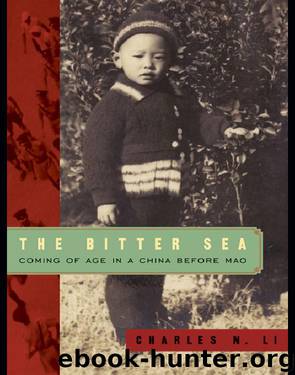The Bitter Sea by Charles N. Li

Author:Charles N. Li [Charles N. Li]
Language: eng
Format: epub
ISBN: 9780061739149
Publisher: HarperCollins
Published: 2008-07-09T16:00:00+00:00
Toward the end of his first year at Peking University, a few months before he met and married Mother, Father was profoundly influenced by the May Fourth Movement, a student-led political movement that metamorphosed into the only true cultural revolution in the history of China.
In early 1919, the victorious nations of World War I convened the Paris Peace Conference. (China was included among the victorious nations, not because of its war efforts, but because of its correct alliance.) At the Conference, the representatives of China urged the conferees to renounce colonial privileges in China in accordance with the ideals of self-determination promoted by President Woodrow Wilson. But England, France, and Japan, the dominant colonial powers in Asia, brushed aside the Chinese position and rejected Wilson’s ideals. The Chinese government was powerless to fight back.
On May Fourth, thousands of students in Beijing poured into the streets to protest what their government had failed to accomplish at the Paris Peace Conference. They congregated at the famous Tiananmen Square in a demonstration against colonialism, as well as against the ineptitude of their own government. Their protest ignited a spontaneous explosion of patriotic response across the nation. Students and workers in all major cities went on strike to show their support of the protest in Beijing. They demanded fundamental reform of the government and the abolishment of the foreigners’ privileges in China, which included immunity in Chinese courts. It was a momentous event for the nation after nearly a century of relentless subjugation by colonial powers.
Strikes and demonstrations notwithstanding, power politics prevailed. Extraterritorial privileges and colonial exploitation of China continued, yet the failed political battle at the international level signaled a democratic awakening of students and workers within the nation. They realized that if they were to stand up against the great powers of the West, they had to reform and modernize their own feudal country. Thus the leaders of the May Fourth Movement decided to begin the modernization effort with a cultural revolution.
One of their first efforts was the abolishment of the use of the fossilized Classical Chinese as the country’s written language. Classical Chinese was based on Confucian texts from the fifth century B.C., and was so unrelated to any currently spoken Chinese dialect that it created an enormous barrier to literacy. Instead of Classical Chinese, the leaders of the May Fourth Movement established a vernacular written language based on Beijing’s spoken language, Mandarin. This vernacular language made it possible to introduce a national educational system to combat illiteracy and ushered in an unprecedented burst of literary creativity.
Like most of his educated contemporaries, Father was swept up by the May Fourth Movement and was subsequently determined to participate in the modernization of the nation. He wanted to study abroad after graduating from Peking University in order to learn firsthand from developed nations such as Japan and England. He was preparing himself to be a political leader. In this way, May Fourth shaped the goals of his life.
At Peking University, Father garnered recognition after recognition for his scholarly achievement.
Download
This site does not store any files on its server. We only index and link to content provided by other sites. Please contact the content providers to delete copyright contents if any and email us, we'll remove relevant links or contents immediately.
| China | India & South Asia |
| Japan |
Fanny Burney by Claire Harman(25796)
Empire of the Sikhs by Patwant Singh(22189)
Out of India by Michael Foss(16317)
Leonardo da Vinci by Walter Isaacson(11927)
Small Great Things by Jodi Picoult(6113)
The Six Wives Of Henry VIII (WOMEN IN HISTORY) by Fraser Antonia(4801)
The Wind in My Hair by Masih Alinejad(4431)
The Lonely City by Olivia Laing(4134)
The Crown by Robert Lacey(4121)
A Higher Loyalty: Truth, Lies, and Leadership by James Comey(4045)
The Iron Duke by The Iron Duke(3657)
Millionaire: The Philanderer, Gambler, and Duelist Who Invented Modern Finance by Janet Gleeson(3577)
Sticky Fingers by Joe Hagan(3461)
Alive: The Story of the Andes Survivors by Piers Paul Read(3325)
Papillon (English) by Henri Charrière(3283)
Joan of Arc by Mary Gordon(3272)
Stalin by Stephen Kotkin(3096)
Aleister Crowley: The Biography by Tobias Churton(3032)
Ants Among Elephants by Sujatha Gidla(2932)
